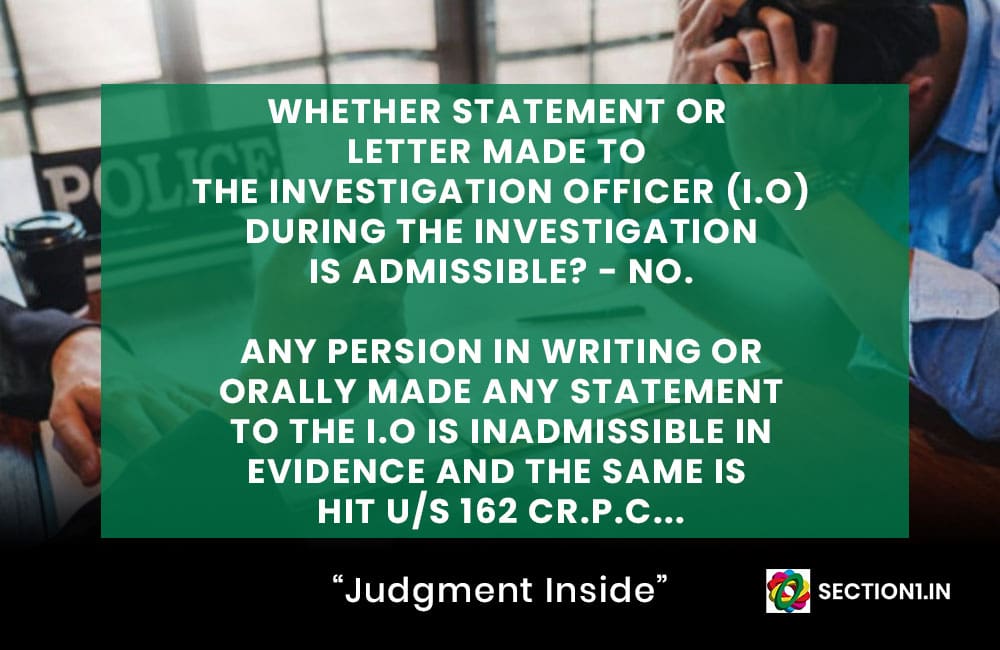Example no. 1: Whether a letter wrote to the investigation officer by a witness during the investigation is admissible in evidence? – Answer is “Emphatic NO”.
The last piece of evidence upon which the High Court has maintained the conviction of the accused consists of the confession of the accused contained in letter PEEE sent by Sahi Ram (PW 4) to· the Station House Officer Renuka. The first question which arises for consideration in respect of letter PEEE is whether it is admissible in evidence. Section 162 of the Code of Criminal Procedure reads as under:
“162. (1) No statement made by any person to a police officer in the course of an investigation under this Chapter shall, if reduced into writing, -be signed by the person making it; nor shall any such statement or any record thereof, whether in a police diary or otherwise, or any part of such statement or record, be used for any purpose (save· as hereinafter provided) at any inquiry or trial in respect of any offence under investigation at the time when such statement was made:
Provided that when any witness is caned for the prosecution in such inquiry or trial whose statement has been reduced into writing as aforesaid, any part of his statement, if duly proved, may be used by the accused, and with the permission of the Court, by the prosecution to contradict such witness in the manner provided by Section 145 of the Indian Evidence Act; 1872 and when any part of such statement is so used, any part thereof may also be used in the re-examination of such witness, but for the purpose only of explaining any matter referred to in his cross-examination.
(2) Nothing in this section shall be deemed to apply to any statement falling within the provisions of Section 32, clause ( 1) of the Indian Evidence Act, 1872, or to affect the provisions of Section 27 of that Act.”
Bare perusal of the provision. reproduced above makes it plain that. the statement made by any person to a police officer in the course of an investigation cannot be used for any purpose except for the purpose of contradicting a witness, as mentioned in the proviso to sub-section (1 ), or for the purposes mentioned in sub-section ( 2) with which we are not concerned in the present case. The prohibition contained in the section relates to all statements made during the course of an investigation. Letter PEEE which was addressed by Sahi Ram to Station House Officer was in the nature of narration of what, according to Sahi Ram, he had been told by the accused. Such a letter, in our opinion, would constitute statement for the purpose of section 162 of the Code of Criminal Procedure. The prohibition relating to the value of a statement made to a police officer during the course of an investigation cannot be set at naught by the police officer not himself recording the statement of a person but having it in the form of a communication addressed by the person concerned to the police officer.
If a statement made by a person to a police officer in the course of an investigation is inadmissible, except for the purposes mentioned in section 162, the same would be true of a letter containing narration of facts addressed by a person to a police officer during the course of an investigation· It is not permissible to circumvent the prohibition contained in section 162 by the investigating officer obtain a written statement of a person instead of the investigating officer himself recording that statement.
PARTY: Kali Ram vs State Of Himachal Pradesh – September 24, 1973 – 1974 (1) SCR 722 (3 judge bench)
Example No. 2: Whether a statement in writing by the witness himself (instead of reduced into writing by the I.O) to the investigation officer during the investigation is admissible in evidence? – Answer is “Emphatic NO”.
24. After the death of the deceased, P.W.6 had gone to the police station and made a written statement. The said statement has been admitted in evidence and marked as Ex.P-14. Curiously, the prosecution also relies on Ex.P-14. It is really disturbing that a statement made during the investigation by a witness, though in writing, falling under Section 161(3) Cr.P.C. had been admitted in evidence, dehors the bar contained in Section 162 Cr.P.C. Probably, the trial court was of the view that since the statement was made in writing by P.W.6, it is admissible in evidence. If that is the impression of the trial court, we want to make it clear that such a statement made by a witness, either in writing or orally and got reduced into writing, cannot be used, except for the purpose of contradicting the maker of the statement as enshrined in Section 162 Cr.P.C. Therefore, Ex.P-14 is eschewed from consideration.
PARTY: Razik Naina Mohamed vs State, through The Inspector of Police, Thondi Police Station, Ramanathapuram District. (Cr.No.96/2009) – Criminal Appeal (MD) No.4 of 2012 and M.P.(MD)No.1 of 2012 – 07/01/2013.



